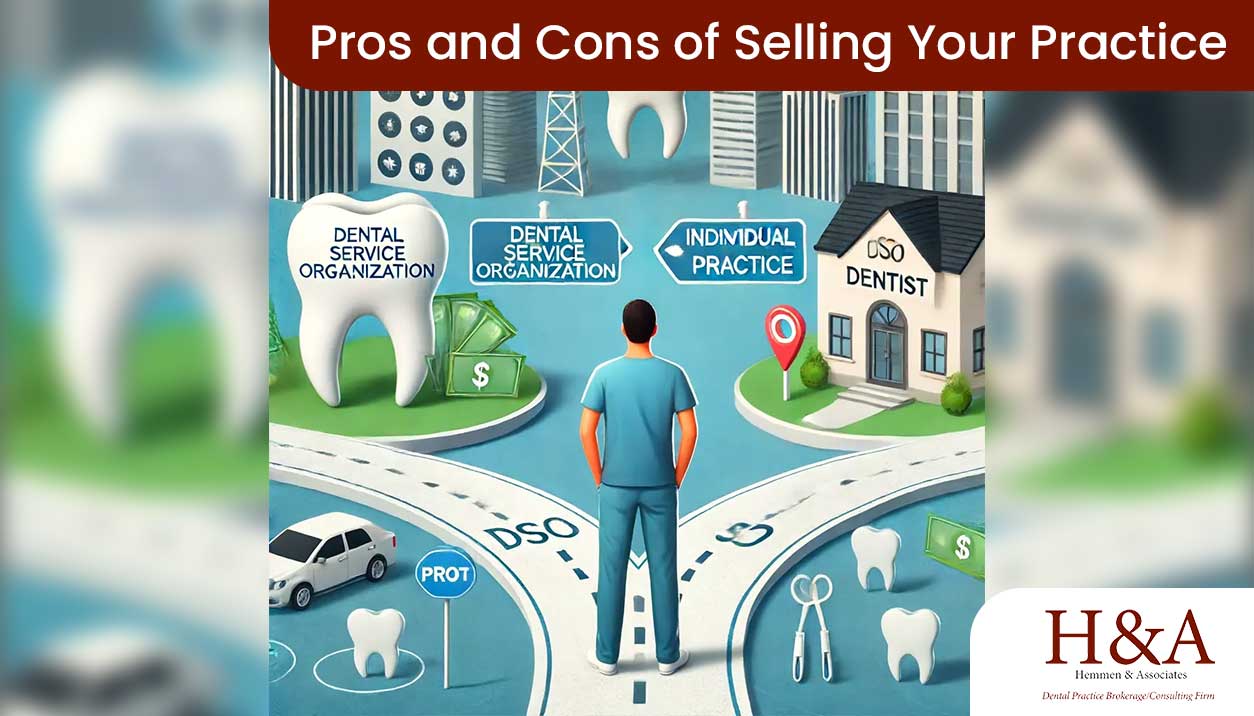Pros and Cons of Selling Your Practice to a DSO vs. an Individual Dentist
Published on
- 06-14-2024
Read Time
- 6 minutes read
Pros and Cons of Selling Your Practice to a DSO vs. an Individual Dentist

One of the hot topics in dentistry today is the expansion of “corporate dentistry” or Dental Service Organizations (DSO’s). It is estimated that, nationally, 15-20% of all practicing dentists are affiliated with DSO’s. In recent years, corporate investors–such as private equity firms and venture capital groups–determined that dentistry was ripe for their involvement because of such things as: (i) rising overhead costs, primarily those related to staff and health insurance expenses; (ii) a trend among new dentists interested in part-time employment and seeking lower-risk job opportunities; and (iii) economies of scale associated with cost volume discounts on supply purchases and marketing campaigns, as well as leverage when negotiating dental insurance reimbursement rates.
So when it comes time to sell your practice, should you sell to a DSO or to an individual dentist? Let’s consider the pros and cons of each, beginning with DSO’s.
DSO’s are generally looking for practices with annual gross revenues in the range of $800,000 to $1,000,000 or more in offices with 5 or more operatories located in specific areas. As such, your practice may or may not be a practice a DSO would be interested in. If they are, one of the biggest advantages–at least on the surface–to selling to a DSO is the potential to receive a price for your practice that is substantially above market; however, when we look more closely at most offers, we find the “premium price” may actually be less than what the practice could be sold for to an individual. Almost universally, DSO’s take the approach of catching a prospective seller’s attention with a very large number. On the surface, it may look like they are paying a big premium for the practice; however, a careful consideration of the other elements of the offer usually reveals the opposite. Unfortunately, many sellers fail to consider all of the details of the offer and focus only on what appears to be a big purchase price upfront. Typically, these offers come with conditions and “catches.” Some of the most common we see are:
- The DSO will frequently require the seller to stay and work for them as an employee in the practice at a reduced compensation of 28-35% of collections for a period of 2 to 5 years. Many sellers fail to factor the loss of profits during this period of time into the overall equation of the offer. The sum total of profits that would have otherwise been retained by the seller during this period (but instead go to the DSO) when offset against the “premium” purchase price, results in a price that is at or below a going market price, one that would have allowed the seller to walk away at closing.
- The DSO will commonly hold-back 20-30% of the purchase price for 1 to 2 years after the closing, making its payment contingent on practice performance during that period of time.
- The DSO will have a lengthy and involved due diligence process, which will require you to take the practice off the market and forego other prospective buyers while they pour over every detail of you and your practice with a fine-toothed comb. This process often prolongs the practice sale by several months as compared to a sale to an individual. At the end of that process, they may elect not to buy your practice, leaving you to start over from square one.
- The DSO may require the seller to accept a portion of the purchase price in the form of equity in their “parent” company with the promise that when they eventually sell that parent company, the seller stands to make a tremendous amount of money. While that may work out for some, it has not worked out for others. This approach comes with significant risk and does not allow the seller any control over the timing, price, or other terms associated with the sale of the parent company. Some sellers have completely lost that portion of their practice value when the company they agreed to take equity in as part of their practice sale goes bankrupt or is otherwise deemed worthless due to mounting company debts.
- The DSO may require your account receivables to be included in the purchase price without any additional compensation being paid for it.
Aside from a potentially favorable offer, the other most recognized advantage to selling to a DSO is being able to absolve yourself of any further risk or responsibility associated with management and ownership of the practice. For some, this is appealing; however, in turning over that risk and responsibility, you also relinquish any decision-making control and autonomy. This can be a significant disadvantage.
Some dentists struggle to grow their practices and make them profitable. These dentists may benefit from selling to a DSO who can market and grow the practice, making it more profitable than it would be otherwise due to their expanded resources and economies of scale. Ironically, if a dentist is struggling to grow their practice and make it profitable, the DSO will not be interested in buying the practice in the first place. What these dentists may not realize, though, is they could hire a marketing and management firm to accomplish those same practice growth and profitability objectives for them for a fraction of the cost of giving up all of their profits, which is what they would have to give up if they sell to a DSO.
We recommend those who are considering selling their practice to a DSO obtain the names of dentists who have previously sold to the DSO as references; then call those dentists to inquire about how the transition worked. Were the sellers happy? Did the DSO change the staff, the practice management software, the dentist’s schedule and hours, the mix of insurance participation, and/or the philosophy of the practice?
A long-standing alternative to selling to a DSO is selling your practice to an individual dentist. The transition will often take less time than a sale to a DSO. While the stated price may be lower, the effective price is often as much or more than the DSO’s offering once all of the contingencies and other terms of the DSO offer are factored in. In most cases, the seller is also paid the full purchase price in cash at closing, without any requirement to take equity in a parent company. After closing, the seller is frequently allowed to walk away from the practice, or if desired, can negotiate to stay on as an associate at a rate of compensation typically higher than what most DSO’s are willing to pay.
Pros and Cons of Selling Your Practice to a DSO vs. an Individual Dentist
When all is said and done, for most sellers, the most important thing is knowing your staff and patients are taken well care of after the sale. Most dentists do not want to hand their practice over to just anyone, not after they have spent years developing close relationships of friendship and trust with their patients and staff. They want to be sure their legacy lives on. This is very difficult to do when selling to a DSO since there is a high likelihood the DSO will experience a turnover of associate dentists. The seller will not know, nor have any say in who they are turning their patients’ dental care over to. If your patients and staff are important to you, the only way to ensure those relationships continue is by selling to an individual whom you are able to hand pick, who shares your practice philosophy, who treats people the way you treat people.
There are plenty of options available when you are ready to sell your practice. It is best to consult with a reputable practice broker who knows your local market and works with the players in that market. If you are contemplating a sale of your practice to a DSO, make sure you confer with a professional who can help you analyze and assess the various elements of the offer they are presenting you. It is important to know if the offer is as good as it may seem on the surface or not. And above all, it is important to consider what legacy you want to leave with your practice.
